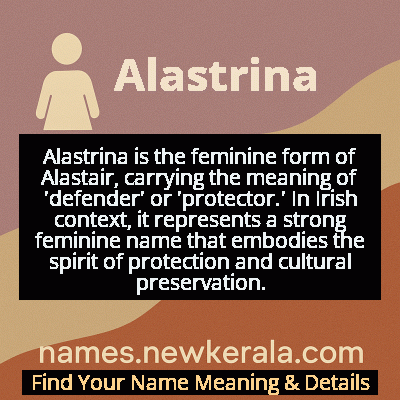Alastrina Name Meaning & Details
Origin, Popularity, Numerology Analysis & Name Meaning of Alastrina
Discover the origin, meaning, and cultural significance of the name ALASTRINA. Delve into its historical roots and explore the lasting impact it has had on communities and traditions.
Name
Alastrina
Gender
Female
Origin
Irish
Lucky Number
5
Meaning of the Name - Alastrina
Alastrina is the feminine form of Alastair, carrying the meaning of 'defender' or 'protector.' In Irish context, it represents a strong feminine name that embodies the spirit of protection and cultural preservation.
Alastrina - Complete Numerology Analysis
Your Numerology Number
Based on Pythagorean Numerology System
Ruling Planet
Mercury
Positive Nature
Adventurous, dynamic, curious, and social.
Negative Traits
Restless, impatient, inconsistent, prone to indulgence.
Lucky Colours
Green, white.
Lucky Days
Wednesday.
Lucky Stones
Emerald.
Harmony Numbers
1, 3, 9.
Best Suited Professions
Sales, marketing, travel, entertainment.
What People Like About You
Versatility, charisma, adventurous spirit.
Famous People Named Alastrina
Alastrina MacLeod
Traditional Singer
Preserved and performed rare Gaelic folk songs from the Scottish Highlands
Alastrina O'Malley
Educator and Activist
Founded Irish language schools during the Gaelic Revival movement
Alastrina Campbell
Textile Artist
Revived traditional Celtic knotwork patterns in modern textile design
Name Variations & International Equivalents
Click on blue names to explore their detailed meanings. Gray names with will be available soon.
Cultural & Historical Significance
The name represents a bridge between ancient warrior traditions and modern feminine empowerment, embodying the Celtic concept of strength through wisdom and community protection rather than mere physical combat. In contemporary Celtic communities, Alastrina continues to symbolize cultural preservation and the enduring spirit of Gaelic heritage, serving as a reminder of the importance of maintaining cultural identity in a globalized world.
Extended Personality Analysis
Women named Alastrina are often perceived as possessing a unique blend of strength and compassion. They typically exhibit natural leadership qualities combined with deep protective instincts toward their loved ones and communities. Their 'avenger' roots manifest not as aggression but as fierce advocacy for justice and fairness. Alastrinas are frequently described as resilient individuals who face challenges with determination and strategic thinking.
They tend to be deeply loyal to their cultural roots while embracing modern perspectives, creating a balance between tradition and progress. Their strength is often tempered with artistic sensitivity and emotional intelligence, making them effective mediators and community builders who defend principles rather than pursuing personal vengeance. This combination of traits makes Alastrinas natural leaders who inspire others through both their conviction and their compassion.
Modern Usage & Popularity
Alastrina remains a relatively rare but cherished name in modern times, primarily found in Irish, Scottish, and diaspora communities. While not appearing on mainstream popularity charts, it has seen a modest resurgence among families seeking unique Celtic names with strong historical roots. The name is particularly popular among those interested in Gaelic revival and Celtic cultural preservation. Its usage has expanded beyond purely Celtic communities as parents worldwide seek distinctive names with meaningful heritage, though it maintains its strongest presence in regions with active Gaelic language and cultural programs.
Symbolic & Spiritual Meanings
Symbolically, Alastrina represents the concept of righteous protection and cultural continuity. The name embodies the transition from physical vengeance to moral defense—protecting traditions, languages, and communities from cultural erosion. It symbolizes the strength found in feminine wisdom and the preservation of heritage through generations. Metaphorically, Alastrina represents the bridge between ancient warrior values and modern peaceful resistance, where 'avenging' transforms into advocating for justice, preserving cultural identity, and defending vulnerable communities against various forms of erosion and injustice.

